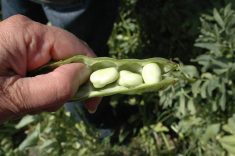New $225-million facility in Strathmore will be a major buyer of peas, venture's founder says
Another pulse processing facility is coming to Alberta, this time in the town of Strathmore.
And the $225-million fractionation plant is going to need a lot of yellow peas from area producers — 40,000 tonnes annually, said Chris Theal, a Calgary oil patch veteran who founded Phyto Organix, and is the privately-held company’s CEO and president.
Sourcing local is part of the company’s plan to be net zero and sustainable, but getting enough peas won’t be an issue, said Theal.
Read Also

The long march to autonomy
The big players in the machinery market keep adding pieces towards autonomous vehicles for farming, but how far away is a final product?
“We’ve got, within 75 kilometres of the facility, about five times our annual capacity,” he said. “If I extend that to 150 kilometres, we’ve got 10 times our capacity.
“Part of the design of that was keeping freight cost low, and in this day and age keeping greenhouse gas emissions low as well.”
About 300 workers will start building the 100,000-square-foot facility this fall and Theal said it will create 60 long-term jobs in Strathmore and produce more than 9,000 tonnes of protein annually when it opens in 2024.
The facility will produce organic and conventional yellow pea protein, selling into diverse markets, he said, adding the company already has 18 food companies and distributors interested in the product.
“It’s going to be Canada, U.S. and Asia,” said Theal.
The company’s state-of-the-art processing technology and environmental sustainability will set it apart from other pulse processing operations, said Theal, adding facilities in Manitoba are major water consumers that compete with municipalities. Phyto Organix plans to reuse 75 per cent of its processing water.
“The other part is, it’s going to be a net zero emissions facility,” he said, adding an ever-larger number of consumers are interested in eating sustainably produced foods.
“That’s the pedigree of what we are going to do. We can provide protein isolate starch and fibre to consumer-packaged goods companies. Using our product, they can label as sustainably processed food.”
Phyto Organix will use multi-phase extraction to recover all protein, allowing the company to access a wider market for meat and dairy alternatives, said Theal. That will produce white, odourless protein powder of high purity — sought-after attributes for food companies, he said.
Being close to growers will help achieve net zero greenhouse gas emissions, but so too will technology. Exchangers to capture and recirculate heat will be used in processing and the company is examining power generation options such as solar and co-generation.
The federal and provincial government are contributing $1 million to the project, with the money being put towards engineering and equipment costs. Phyto Organix said the project is the largest-ever capital investment in Strathmore, and estimates it will add $120 million annually to the area’s GDP and $7 million in employment income.
One area farmer is happy to hear of the new pea processing facility.
Jay Schultz, who operates a medium-sized grain farm near Standard, said the processing plant will help alleviate some of the problems plaguing western Canadian agriculture.
“We export pretty much everything,” he said. “Any little problem that comes — transportation or restrictions or phytosanitary issues — can really cause major hiccups in our system. Any time that we can export a finished product, that has far fewer potential problems.
“If we can build plants like this, it’s major for Western Canada, especially our area.”
Strathmore is a key agriculture area with a historical lack of farm services development, said Shultz.
“So this is really encouraging to see, something of this scale being built,” he said. “And I’m very encouraged to see they will take both conventional and organic peas. At the end of the day, it comes down to price. If they are willing to pay and they want certain qualities, then farmers will try and meet that demand.”
The story of Phyto Organix is very much tied to Theal’s own history. In 2020, he suffered a fractured skull in a recreational hockey game.
“A critical component of my recovery was incorporating an anti-inflammatory diet,” he states on the company’s website. “Two years later, that regime — a whole food diet consisting of a high intake of Omega 3 fats, plant foods and natural sugars and removing caffeine, dairy, gluten and starch — is a lifestyle diet and the outcomes have been great.”
Phyto Organix is the third major pulse processing plant for Alberta, which initially was far behind Manitoba and Saskatchewan in the fast-emerging sector.
However, British company Lovingly Made Foods opened a facility in Calgary in 2021 and is planning to double capacity (to produce 6,000 tonnes of plant protein annually). And another start-up, More Than Protein Ingredients, is building a $100-million facility in Bowden that will open next year.















